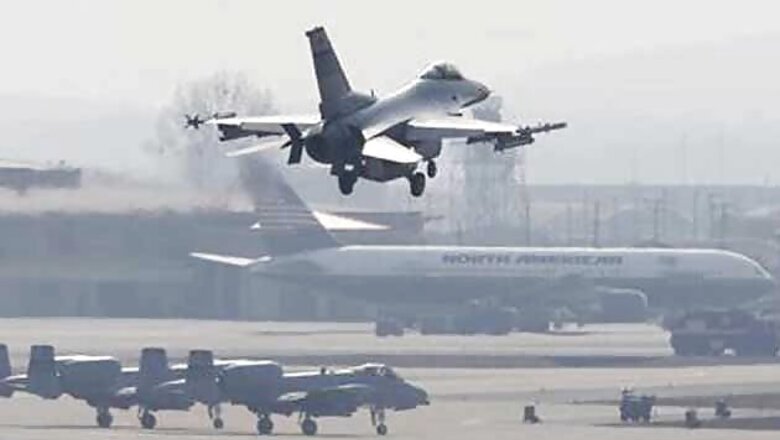
views
Washington: The United States said on Wednesday it would soon send a missile defense system to Guam to defend it from North Korea, as the US military adjusts to what Defense Secretary Chuck Hagel has called a "real and clear danger" from Pyongyang.
At the same time, North Korea repeated its threat to launch a nuclear attack on the United States. Pyongyang said it had ratified a potential strike because of US military deployments around the Korean peninsula that it claimed were a prelude to a possible nuclear attack on the North.
Washington had been informed of the potential attack by North Korea, a spokesman for its army said in a statement carried by the English language service of state news agency KCNA. It was unclear how such a warning was given since North Korea does not have diplomatic ties with Washington.
Experts say North Korea is years away from being able to hit the continental United States with a nuclear weapon, despite having worked for decades to achieve nuclear-arms capability.
North Korea has previously threatened a nuclear strike on the United States and missile attacks on its Pacific bases, including in Guam, a US territory in the Pacific. Those threats followed new UN sanctions imposed on the North after it carried out its third nuclear test in February.
"Some of the actions they've taken over the last few weeks present a real and clear danger," Hagel told an audience at the National Defense University in Washington.
US stocks sank to their lows of the day after Hagel's comments and the Guam deployment news.
The yield on the benchmark 10-year US Treasury note briefly dropped below 1.8 per cent for the first time since January 2013 as investors sought safety in government bonds, driving their prices higher. The dollar strengthened modestly against the euro and yen.
The South Korean won hit a six-month low on Wednesday.
"I would say that people are taking it a lot more seriously than they used to," said Steve Van Order, a fixed income strategist at Calvert Investments in Maryland, referring to the tensions with North Korea.
Despite the rhetoric, Pyongyang has not taken any military action and has shown no sign of preparing its 1.2 million strong armed forces for war, the White House said on Monday.
That would indicate that its threats are partly intended for domestic consumption to bolster young leader Kim Jong-un ahead of celebrations marking the anniversary of the birthday of Kim Il-sung, the state's founder and the younger Kim's grandfather, on April 15, 2013.
Caitlin Hayden, spokeswoman for the White House National Security Council, criticised the latest North Korean statement.
"It is yet another offering in a long line of provocative statements that only serve to further isolate North Korea from the rest of the international community and undermine its goal of economic development," Hayden said.
North Korea had "ratified" a merciless attack against the United States, potentially involving a "diversified nuclear strike", the KCNA statement concluded after railing against annual war games between South Korea and the United States that run throughout April.
"The moment of explosion is approaching fast. No one can say a war will break out in Korea or not and whether it will break out today or tomorrow," the KCNA statement said.
HAGEL: MUST TAKE THREATS SERIOUSLY
Hagel said he had to take the threats seriously, language he has used in recent weeks as the United States has revamped its missile defense plans and positioned two guided-missile destroyers in the western Pacific to bolster missile defense.
The United States has also flexed its muscle during the military drills with South Korea, flying two radar-evading stealth bombers on a first-of-its-kind practice bombing run over South Korea.
In the latest move, the Pentagon said it was deploying a Terminal High Altitude Area Defense system to Guam in the coming weeks. The THAAD system includes a truck-mounted launcher, interceptor missiles and an AN/TPY-2 tracking radar.
In March, Hagel said the Pentagon would add 14 new anti-missile interceptors in Alaska and move ahead with the deployment of a second missile-defense radar in Japan.
Adding to tensions, North Korea on Wednesday closed access to a joint factory zone with South Korea, putting at risk $2 billion a year in trade that is vital to the impoverished state.
It said on Tuesday it would revive a mothballed nuclear reactor able to produce bomb-grade plutonium.
Hagel called America's responses so far "measured, responsible, serious" and also said the United States was working with allies to lower tensions.
"We are doing everything we can, working with the Chinese, others to defuse that situation on the peninsula," he said.
In Beijing, China's deputy foreign minister met ambassadors from the United States and both Koreas to express "serious concern" about the Korean peninsula, China's Foreign Ministry said on Wednesday.
It was a sign that China, the North's major benefactor, was increasingly worried about events spinning out of control.



















Comments
0 comment